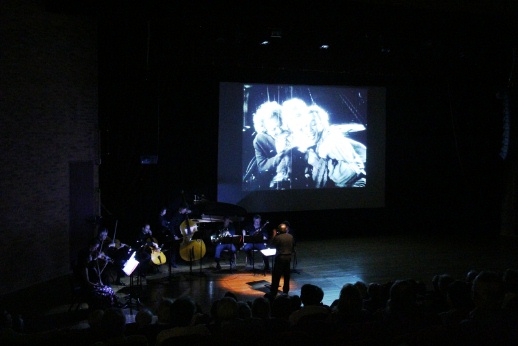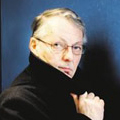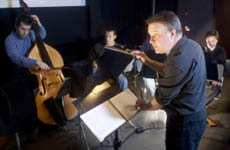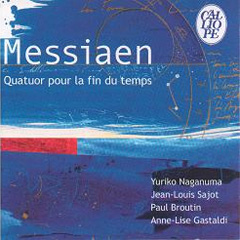The Projections-Concerts
Silent Films and Live Music
Fifteen classics of the silent cinema accompanied “live” with music written for the Octuor de France by Gabriel Thibaudeau and Antonio Coppola, plus a score written by Raymond Alessandrini.

(Romorantin – 2011 – Photo HAG)
A unique Event
The 1997 encounter with Pierre-Henri Deleau, founder of the “Directors’ Fortnight” at the Cannes Film Festival, led to the creation of a unique concept. The live accompaniment of masterpeices of the silent cinema to music written especially for the Octuor de France is recognised as a worldwide innovation.
“The Marriage of Image and Music”
“George Autheil, Dimitri Chostakovitch, Paul Dessau, Hanns Eisler, Arthur Honegger, Jacques Ibert, Maurice Jaubert, great composers who, among many others, agreed to work for the silent cinema. All this music, created for world premieres and sometimes later printed on the film, has come down to us and shows how from the beginnings of the cinema industry, film makers dreamt of combining sound or speech with the picture. But producers did not always have the financial means to employ a composer and an orchestra to interpret their music. Hence the introduction of improvised and uncertain piano accompaniments.
It is for this reason that we decided to look again at certain masterpieces of the silent cinema and give them, a posteriori, the musical accompaniment they were capable of inspiring. This, of course, assumes the composer’s respect for the film-maker’s intentions and thought processes ; in short, great humility is necessary in the writing of the score which must not roam freely but follow faithfully the action of the film. That is the great quality of Raymond Alessandrini, Antonio Coppola and Gabriel Thibaudeau who, in accepting this discipline, justify their claim to be true composers for the silent cinema. Thus they give to André Antoine (“L’hirondelle et la mésange”, 1920), Paul Leni (“The Man who laughs”, 1928), Rupert Julian (“The Phantom of the Opera”, 1925), Julien Duvivier (“Au bonheur des dames”, 1925 and “Poil de Carotte, 1925), René Clair (“Paris qui dort”, 1923), Louis Feuillade (“Séraphin ou les jambes nues”, 1921), Allan Dwan (“The Iron Mask”, 1929), Jacques Feyder (“Visages d’enfants”, 1925 and (“Crainquebille”, 1922), Harold Lloyd (“The Kid Brother”, 1927), Ernst Lubitsch (“Romeo and Juliet in the snow”, 1920), Buster Keaton (College) 1927, and Max Linder (1910 to 1913), the voice, or rather the sound which was not available to them.
Luck decreed that for the creation of this new music, the « Octuor de France » founded by Jean-Louis Sajot, interpreters of the music of Antonin Reicha, Weber, Mozart, Brahms, Haydn, Bach, but also of Jean Françaix and Marcel Landowski (the recordings of which have brought them much praise), agreed to take part in the adventure of what we call today “projections-concerts”. Thus, since 1998, the date of the first showing of “The Man who laughs” for the “Directors’ Fortnight” at the Cannes Film Festival, and the world premiere of Gabriel Thibaudeau’s musical score, the « Octuor de France » has constantly enlarged its repertoire and alternates between its classical chamber music concerts and the accompanying of silent films throughout the world (New York, New Orleans, Montreal, Boston, Telluride, Washington, Paris, Strasbourg, Tours, Bologna, Rome, Athens, Helsinki, Tokyo, Minsk, Barcelona, etc…) Thanks, then, to the « Octuor de France » for enabling a new public to discover and get to know masterpieces of the silent cinema which are often too quickly forgotten. Well done and thanks to the Artists!”
text by Pierre-Henri Deleau
PIERRE-HENRI DELEAU
 A “compulsive consumer of images” on cinema or TV screens, and a discoverer of talents and new trends, Pierre-Henri Deleau has enabled many film festivals to profit from his knowledge of the cinema, among them, the “Director’s Fortnight” in Cannes, which he directed for 30 years, and the FIPA. His creed is to share his passion and his enthusiasm. This he has done amply, contributing to at least 14 festivals since 1969 and he is still the Artistic Director of several events which take place each year. He has also been a member of the Arte Drama Department reading committee since 1990, and a member of the European Film Academy board of directors since 1997.
A “compulsive consumer of images” on cinema or TV screens, and a discoverer of talents and new trends, Pierre-Henri Deleau has enabled many film festivals to profit from his knowledge of the cinema, among them, the “Director’s Fortnight” in Cannes, which he directed for 30 years, and the FIPA. His creed is to share his passion and his enthusiasm. This he has done amply, contributing to at least 14 festivals since 1969 and he is still the Artistic Director of several events which take place each year. He has also been a member of the Arte Drama Department reading committee since 1990, and a member of the European Film Academy board of directors since 1997.
 English
English Français
Français












